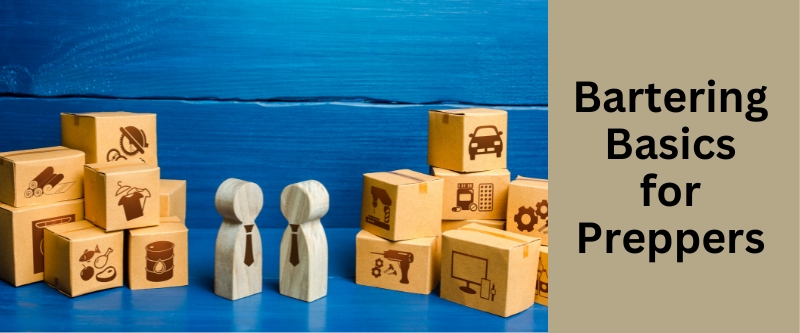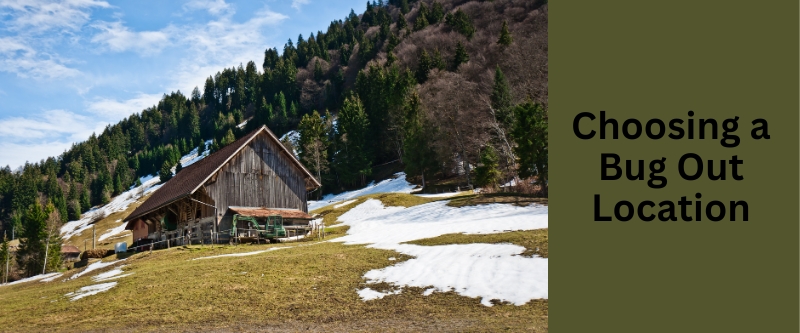Table of Contents
Barter Scenario
The diligent prepper is usually so preoccupied with making sure that his family’s SHTF supply of essentials is secured, that he doesn’t give bartering much of a thought.
But in fact, future bartering should be a key part of the prepper’s strategy when it comes to surviving and thriving in a post-SHTF world. This is a world where the traditional currency has lost so much value that it buys next to nothing.
Bartering in Context
Bartering is a trading system that involves the direct exchange of goods or services between two people. This is sometimes made a little more sophisticated by the introduction of a middleman, as a kind of primitive exchange mechanism. The recorded history of bartering goes back to Mesopotamia 6,000 years ago.
The weakness of bartering is that it requires each of the two parties to possess something that the other party wants, and both parties must agree that the exchange is fair.
This is very cumbersome and is why currencies were developed to establish a common way of determining value. But when the currency goes south in the SHTF scenario, it’s back to bartering. And we’ll have to live with it as a way of navigating the new world around us.
Barter as a Prepper Strategy
In a roundabout kind of way having stuff on hand to barter is like having money in the bank. You can use your stuff to buy other people’s stuff.
So clearly, stockpiling items specifically for barter is a strategic prepper move. From that point of view, it’s best to focus on high-value items that require minimum storage space. Here are some examples.
High Value – Minimum Space
- Precious Metals: Small gold and silver coins or bars are compact and have intrinsic value. They’re universally recognized and can be used for significant trades.
- Spices & Salt: Historically, spices and salt have been valuable trade commodities. They’re lightweight, have a long shelf life, and can enhance the flavor of food.
- Medications: Over-the-counter pain relievers, antibiotics, and other essential medicines are always in demand. They’re small and can be life-saving.
- Seeds: Non-GMO, heirloom seeds for gardening can be invaluable. They represent future food sources and are lightweight.
- Mini Alcohol Bottles: Alcohol can be used for medicinal purposes, as a disinfectant, or as a comfort item. Small bottles are easy to trade and store.
- Tobacco & Cigarettes: Even if you don’t use them, they’re always in demand. Consider vacuum-sealing to prolong freshness.
- Ammunition: Popular calibers like 9mm, .223, ..38. 22LR, and 12-gauge shotgun shells can be valuable. Store them in airtight containers to prevent corrosion.
- Coffee & Tea: Small vacuum-sealed packs of coffee or individual tea bags can be a luxury in hard times.
- Batteries: Especially AA and AAA sizes. They’re essential for powering devices and have a decent shelf life.
- Condoms: They take up little space and can be essential for family planning in prolonged survival situations.
- Travel-sized Hygiene Products: Mini toothpaste, soap bars, and shampoo bottles are compact and always needed.
- Essential Oils: They have multiple uses, from medicinal to relaxation, and are compact.
- Compact Tools: Multi-tools, pocket knives, and small repair kits can be invaluable and don’t take up much space.
- Water Purification: Items like water purification tablets or small portable filters like LifeStraw are lightweight and crucial for clean water.Hard Candy: It’s a comfort item, provides quick energy, and has a long shelf life.
The key to a successful barter stockpile is understanding the potential needs of the community around you.
Strategic Aspects of Bartering
Strategic stockpiling goes beyond the accumulation of suitable bargaining stuff. A thoughtful approach brings in other considerations. Here are some points to ponder:
Community Relationships
Building trust within your community before a crisis can be invaluable. Knowing your neighbors’ skills and resources can help you stockpile complementary items. For instance, if a neighbor has a large garden, stockpiling extra seeds might be less of a priority for you. On the other hand, you might have seeds that your neighbor wants in exchange for some fresh produce, for example.
Building the Barter Stockpile
In planning and budgeting for your personal prepper stockpile, consider adding a notional 10% as a safety margin that could become available for barter.
Security
While having a stockpile is a sensible strategy, it can also make you a target. It’s essential to keep your stockpile discreet. Consider diversifying storage locations to ensure that if one stash is discovered or stolen, you don’t lose everything. This applies to your entire stockpile, not just what you have set aside for barter.
Liquidity vs Long-Term Value
Some items, like alcohol or cigarettes, might have immediate “liquid” value in a post-disaster scenario due to their demand. In contrast, items like seeds or tools might have more long-term value as people look to rebuild and sustain themselves.
Barter Etiquette
In a post-disaster world, trust will be a premium commodity. Always be fair in your trades, avoid exploiting desperate people, and be ready to walk away from a trade if it seems wise. Avoid confrontations and always try to have more than two people present at a transaction.
Documentation
Keep records of your trades, and exchange mutually signed receipts. This will help avoid disputes and create relationships.
Your Skill as a Trading Commodity
Remember that bartering isn’t just about physical items. Skills, whether medical expertise, mechanical knowledge, or the ability to teach, can be just as valuable. Consider enhancing your skill set as part of your strategic stockpiling.
Diversification
Just as with financial investments, diversifying your barter stockpile can protect against unforeseen changes in demand. Don’t rely too heavily on one type of item.
Quality Over Quantity
It might be tempting to stockpile large quantities of cheap items for barter, but quality can often trump quantity. Durable goods, reliable tools, or high-quality food items might fetch a higher “price” in a barter situation than bulk, low-quality alternatives.
This becomes even more advisable if space is tight.
Stay Informed
The value of items can change based on external factors. Stay informed about global and local events, and adjust your stockpile strategy accordingly.
Practice Scenarios
Engage in mock bartering scenarios with fellow preppers or trusted community members. This can help you gauge the value of your items and refine your negotiation skills.
Emotional Value
In stressful times, items with emotional or comfort value (like chocolate, toys for kids, or books) can become surprisingly valuable. People will crave normalcy and comfort, and items that provide that can be powerful barter tools.
Think Before You Discard
In the ordinary course of life, we routinely toss or give away things that we no longer need. But before you do this, consider whether you should add the item to your bartering stockpile instead.
In essence, strategic bartering in a SHTF scenario is about more than just having items to trade. It’s about understanding the evolving landscape, building and maintaining trust, and being adaptable to ensure your safety and maximize the value of your trades.
Barter Items
All that said, here is a list of items that could have barter value. We are sure you could think of things to add to it. This is also a useful check of what you ought to have in inventory for your own use anyway.
Food & Beverages
- Dry beans: A long-lasting staple that provides essential protein.
- Rice: Easy to store and cook, a primary source of carbohydrates.
- Noodles: Quick-cooking and versatile for various dishes.
- Flour: Essential for baking and making various foods.
- Spices: such as cinnamon, cloves, allspice, sage, parsley etc. enhance the flavor of meals, making them more palatable.
- Coffee: A sought-after luxury and source of caffeine.
- Coffee filters
- Cocoa: Comfort food and can be used to make hot chocolate.
- Canned food: Long shelf life and provides a variety of nutrients.
- Cooking Oil: Necessary for cooking many meals.
- Baking Soda
- Fresh garden produce and herbs
- Pepper & Salt: Basic seasonings used in almost every dish.
- Sugar: Sweetener for foods and beverages.
- Honey: Natural sweetener with medicinal properties.
- Hard candy: Comfort food and quick energy source.
- Popcorn: Easy-to-make snack.
- Kool-aid: Flavorful drink mix.
- Chocolate: Comfort food with a mood-boosting effect.
- Powdered Milk: Long shelf life and source of calcium.Spirits: wine, whisky, beer, vodka, brandy for consumption, disinfection, or bartering.
Medical & Hygiene
- Toothpaste & Toothbrushes: Essential for dental hygiene.
- Dental floss: Important for dental care.
- Grooming Essentials: Combs, Hairbrushes, Hairpins, etc.
- Disposable razors: For personal grooming and hygiene.
- Nail clippers and files: Basic grooming tools.
- Feminine products: Essential for women’s hygiene.
- Bars of soap: Basic hygiene necessity.
- Toilet paper: Essential hygiene item.
- Ibuprofen, Tylenol, and aspirin: Pain relievers and fever reducers.
- Essential oils: Used for various ailments and relaxation.
- Cough syrup: Relief for cold symptoms.
- Eye drops: Relief for dry or irritated eyes.
- Band-aids: Basic first aid item for minor cuts and scrapes.
- Lip balm or chapstick: Protects and moisturizes lips.
- Vitamins and Supplements: Boosts health and immune system.
- Diapers and Wipes: Essential for babies and toddlers.
- FN95 Respirators: Protection against airborne particles and diseases.
- Morning After Pills: Emergency contraception.
- Condoms: Birth control and disease prevention.
Household & General Supplies
- Hand crank or manual can openers.
- Candles: Source of light during power outages.
- Garden tools: Essential for growing food.
- Insect spray & Fly swatters: Protection against pests.
- Rodent traps & poison: Control rodent infestations.
- Scissors, Needles, and Pins: Basic tools for various tasks.
- Straight pins
- Safety pins
- Elastic-material
- Cotton balls
- Buttons & Thread: For mending clothes.
- Matches: Essential for starting fires.
- Cigarette lighters
- Bleach: Disinfectant and water purification.
- Pencils & Pens: Basic writing tools.
- Paper (all kinds): Communication and note-taking.
- Batteries: Power source for various devices.
- Cigarettes & Tobacco: Addictive goods with high barter value.
- Aluminum foil: Cooking and other uses.
- Plastic sheeting: Shelter and protection.
- Socks: Essential clothing item.
- Shoelaces: For repairing shoes.
- Reading glasses: Aid for those with vision problems.
- Garbage bags (can’t have too many): Multiple uses including waste disposal and water collection.
- Brooms & Dustpans: Cleaning tools.
- Clothes pins & lines: For drying clothes.
- Garbage cans: Waste disposal.
- Laundry supplies: Fels naphtha bar soap
- Washing/laundry soda
- Borax
- Oxyclean
- Homemade laundry detergent
- Chewing Gum: Comfort item with potential uses in trapping and sealing.
Tools & Equipment
- Rope: Multiple uses from tying to lifting.
- Plastic tarps: Shelter, ground cover, and protection.
- Duct tape: Repair tool with countless uses.
- Axes: Tool for chopping wood and defense.
- Nails & screws; nuts & bolts: Essential for construction and repairs.
- Garden seeds: For growing food, esp Heirloom seeds.
- Garden related: compost, Garden fertilizer, Plastic tubs & containers
- Oil & filters: For vehicle maintenance.
Miscellaneous
- Pepper Spray: Non-lethal self-defense tool.
- Firearms & Ammunition: Defense and hunting.
- Precious Metals: Tangible assets with intrinsic value.
- Skills and Knowledge: Intangible assets that can be traded for goods/services.
- Livestock: Source of food and other products.
- Fuel: Essential for heating and transportation.
- Books: Knowledge and entertainment.
- Coloring books & crayons: Entertainment for children.
- Firewood: Heating and cooking.
- Livestock Feed: Essential for raising animals.Natural Pesticides: Protect crops without harmful chemicals.
Concluding Thoughts
When SHTF, tangible goods and services regain their ancient prominence as mediums of exchange. So it behooves us preppers to understand and embrace bartering as another important tool to help us adapt, survive, and thrive.
- Related post: Financial Prepper Playbook
FAQs on Preppers and Bartering
What are the top items for bartering?
Essential items like food, water, medical supplies, and tools are highly sought after, but luxury items like alcohol, tobacco, and coffee can also hold significant value.
Is it safe to barter with strangers?
Caution is advised. Always prioritize safety, consider meeting in neutral locations, and avoid revealing too much about your own supplies. Have a third party with you.
How do I determine the value of an item in a barter situation?
The value is subjective and based on demand, scarcity, and the needs of both parties. It’s essential to be flexible and open to negotiation.
Should I stockpile items specifically for bartering?
Yes, having a separate stash of barter-specific items can be beneficial, especially if they are compact, non-perishable, and in high demand.
Can skills be bartered?
Absolutely! Skills like medical knowledge, mechanical expertise, or farming can be just as valuable, if not more so, than tangible items.




Leave a Reply